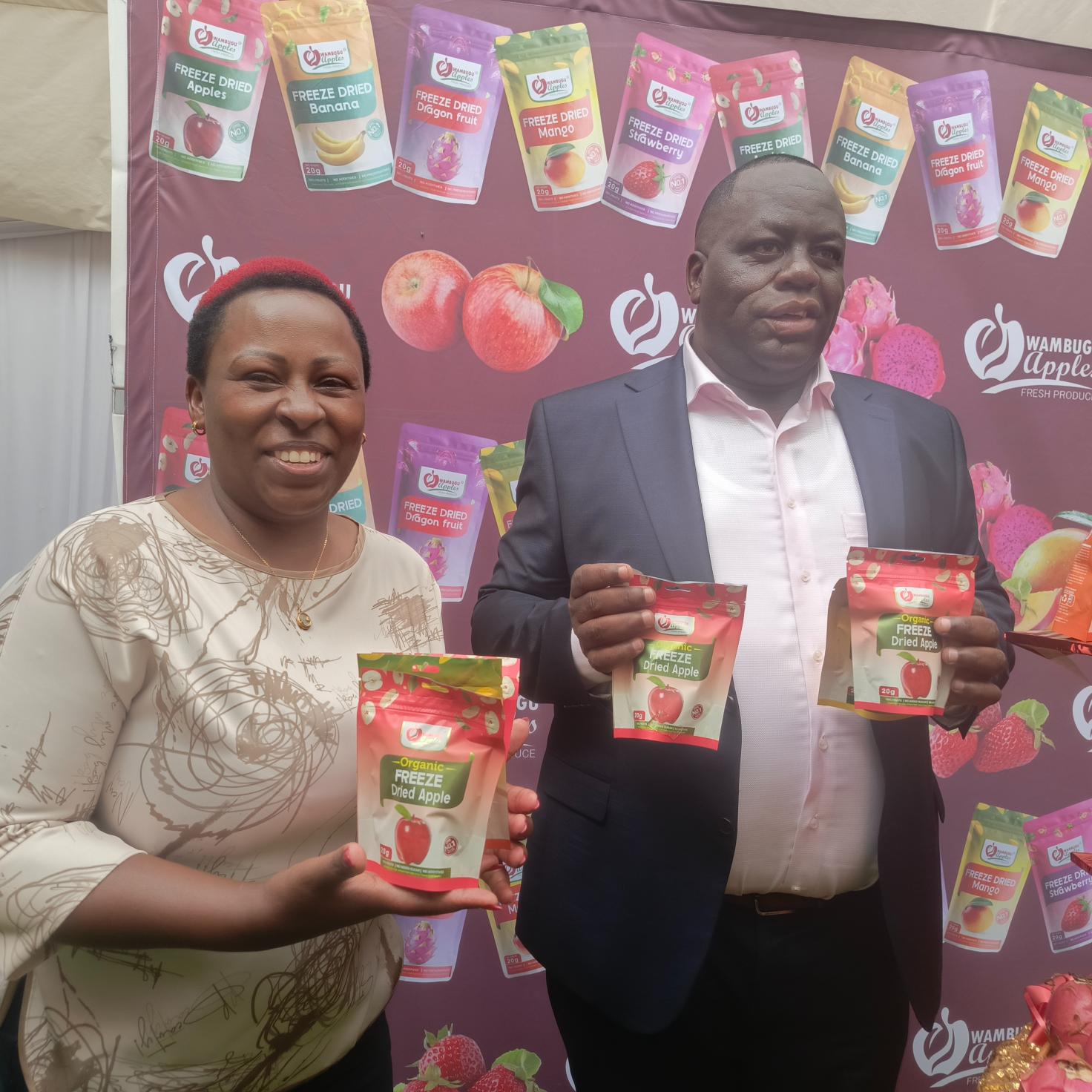
 Catherine Wambugu, Director of Wambugu Apples, and Mathew Njenga, Managing Director, at the launch of the freeze-dried fruits/AGATHA NGOTHO
Catherine Wambugu, Director of Wambugu Apples, and Mathew Njenga, Managing Director, at the launch of the freeze-dried fruits/AGATHA NGOTHO In a bold move to reduce post-harvest losses and unlock new income streams for Kenyan farmers, Wambugu Apples has launched a line of freeze-dried fruit products, promising to reshape the local horticultural industry.
The innovation uses advanced food processing technology to extend the shelf life of perishable fruits such as apples, mangoes, bananas, strawberries, and dragon fruit, from less than ten days to almost a year.
By preserving the taste, nutrients, and structure of the fruits, freeze-drying creates value-added products with local and export potential.
“This milestone marks our commitment to innovation and value addition in the horticulture sector,” said Mathew Njenga, Managing Director of Wambugu Apples.
“Our goal is to unlock economic potential for farmers and contribute to a sustainable food system.”
The freeze-dried fruits were unveiled at a launch event attended by industry stakeholders, including Christine Chesaro, Acting Director of the Horticultural Crops Directorate (HCD) under the Agriculture and Food Authority.
She welcomed the innovation, calling it a timely solution to one of the sector’s biggest challenges—post-harvest losses.
“Fruits are highly perishable, and losses can reach up to 40 per cent due to lack of proper storage and processing,” Chesaro noted.
“This new technology provides a practical solution that not only preserves fruit but also creates new products like fruit powders for use in yoghurt, cooking, or even baby food.”
According to Chesaro, Kenya’s horticultural sector is dominated by local consumption, with only five per cent of produce making it to export markets. Of those exports, 50 per cent are flowers, 30 per cent fruits, and 20 per cent vegetables.
In 2024 alone, the country exported fruits worth Sh32 billion—led by avocados at Sh23 billion and mangoes at Sh9 billion.
“There’s huge potential in other fruits, but volumes remain low,” Chesaro said. “Freeze-drying could open doors to new markets and more diverse fruit exports.”
She also highlighted the potential for dried fruit products in schools, offering children healthy, convenient snack options.
“This is how we link agriculture to nutrition and innovation in everyday life,” she said.
Chesaro urged youth to explore agribusiness, saying agriculture remains one of the most viable sources of income in a tightening job market.
“The population is growing, jobs are scarce, but food is always in demand. Parents should support young people entering the sector,” she said.
Njenga echoed her sentiments, adding that post-harvest management is the missing link in many farmers’ value chains.
“Farmers work hard to grow their crops, but without access to markets or preservation methods, a lot goes to waste. Freeze-drying helps reduce this waste and creates products with longer shelf lives and wider use,” he said.
Wambugu Apples initially focused on apples but quickly expanded into other fruits after seeing broader demand. “Mangoes and dragon fruit are among our top-performing products,” Njenga revealed.
He criticised the longstanding practice of exporting only top-quality produce while leaving local consumers with lower-grade options.
“We want to change that. Everyone, including Kenyan consumers, deserves access to high-quality, nutritious food,” he said.
The freeze-drying process, known as sublimation, involves freezing the fruit and then removing water content without damaging its structure, aroma, or nutritional value. The process takes about 12 hours and is designed to be efficient and scalable.
The company invested around Sh200 million into the venture, including importing specialised equipment. Njenga said Wambugu Apples plans to work closely with contracted farmers to grow fruits specifically for processing.
“By building strong relationships with growers, we can create a reliable supply chain, reduce wastage, and offer farmers stable incomes,” he said.
He also called on the government to support such innovations with subsidies and incentives, noting that countries like India have successfully built farmer-centred value chains through policy support.
“Our ultimate goal is to feed the nation first, empower farmers, and create a circular economy around fruit production,” Njenga said.
“There’s a ready market for freeze-dried and value-added products both locally and abroad.”
As the company looks to scale operations, its innovation is being hailed as a game-changer for Kenya’s horticulture sector—combining technology, sustainability, and economic empowerment in one fruitful package.












